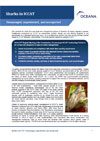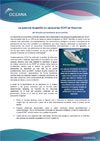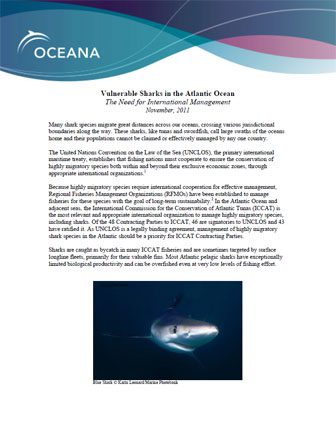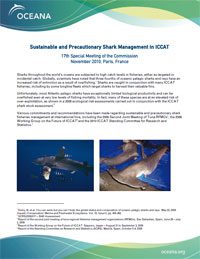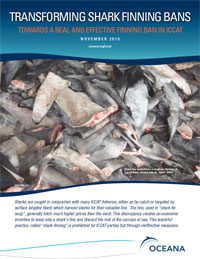ICCAT: Learn More About Sharks
Sharks throughout the world’s oceans are subjected to high catch levels in fisheries, as both targeted and incidental catches.
Globally, scientists have noted that three-quarters of oceanic pelagic sharks and rays have an increased risk of extinction as a result of overfishing. Sharks are caught in conjunction with many ICCAT fisheries, including by some longline fleets that target sharks for their valuable fins.
Unfortunately, most Atlantic pelagic sharks have exceptionally limited biological productivity and can be overfished even at very low levels of fishing mortality. In fact, many of these species are at an elevated risk of over-exploitation, as shown in ecological risk assessments carried out by ICCAT in 2008 and 2012. Despite this high vulnerability, most shark species in ICCAT do not have any specific management measures in place, with the exception of six rare species that have now been prohibited for capture. The most commercially important shark species – blue sharks and shortfin makos – are fished without any limits, despite high uncertainty about the status of their stocks.
2014. If not now, then when?
Sharks represent a significant component of ICCAT fisheries. Valued for their fins and meat, they rank among the key captured species in ICCAT, accounting for 12% of all catches reported to ICCAT in 2013. By weight, blue shark is now the fourth most important commercial species in ICCAT fisheries, after skipjack, yellowfin, and bigeye tunas. Read more
 2013. Sharks in ICCAT. Unmanaged, unprotected and unreported
2013. Sharks in ICCAT. Unmanaged, unprotected and unreported
Up to 24 countries may be catching sharks in the Atlantic Ocean and Mediterranean Sea but failing to report these catches, as is legally required by ICCAT. By comparing 2012 data on reported shark catches in ICCAT, the international shark fin trade, and vessels authorised to fish under ICCAT, Oceana identified two categories of countries that may not have complied with ICCAT regulations: (1) countries that did not report shark catches, yet exported shark fins to Hong Kong; and (2) countries that did not report shark catches, yet have ICCAT-authorised longliners, fishing vessels that are very likely to catch sharks. Read more
 2012. ICCAT’s Unmanaged Shark Fisheries
2012. ICCAT’s Unmanaged Shark Fisheries
Sharks are among the key species caught in ICCAT fisheries, representing more than 15% of all reported catches by weight in 2010. They are also among the most vulnerable species to overfishing. Their biological characteristics and slow population growth rates make them inherently less able to cope with heavy fishing pressure than many of the other fish species with which they are caught. As a result, they are easily overexploited, and once depleted, their populations are slow to recover. Oceanic pelagic sharks, which are the main shark species caught in ICCAT fisheries, are particularly at risk, with 63% of assessed species considered threatened.
 2011. Vulnerable Sharks in the Atlantic Ocean
2011. Vulnerable Sharks in the Atlantic Ocean
Many shark species migrate great distances across our oceans, crossing various jurisdictional
boundaries along the way. These sharks, like tunas and swordfish, call large swaths of the oceans
home and their populations cannot be claimed or effectively managed by any one country.
The United Nations Convention on the Law of the Sea (UNCLOS), the primary international
maritime treaty, establishes that fishing nations must cooperate to ensure the conservation of
highly migratory species both within and beyond their exclusive economic zones, through
appropriate international organizations Read More
 2010. Sustainable and Precautionary Shark Management in ICCAT
2010. Sustainable and Precautionary Shark Management in ICCAT
Sharks throughout the world’s oceans are subjected to high catch levels in fisheries, either as targeted or incidental catch. Globally, scientists have noted that three-fourths of oceanic pelagic sharks and rays have an increased risk of extinction as a result of overfishing.1 Sharks are caught in conjunction with many ICCAT fisheries, including by some longline fleets which target sharks to harvest their valuable fins.
Unfortunately, most Atlantic pelagic sharks have exceptionally limited biological productivity and can be overfished even at very low levels of fishing mortality. In fact, many of these species are at an elevated risk of over-exploitation.
 2010. Transforming shark finning bans. Towards a real and effective finning ban in ICCAT
2010. Transforming shark finning bans. Towards a real and effective finning ban in ICCAT
Sharks are caught in conjunction with many ICCAT fisheries, either as by-catch or targeted by surface longline fleets which harvest sharks for their valuable fins. The fins, used in “shark fin soup”, generally fetch much higher prices than the meat. This discrepancy creates an economic incentive to keep only a shark’s fins and discard the rest of the carcass at sea. This wasteful practice, called “shark finning”, is prohibited for ICCAT parties but through inefffective measures. Read More (Spanish / French)


